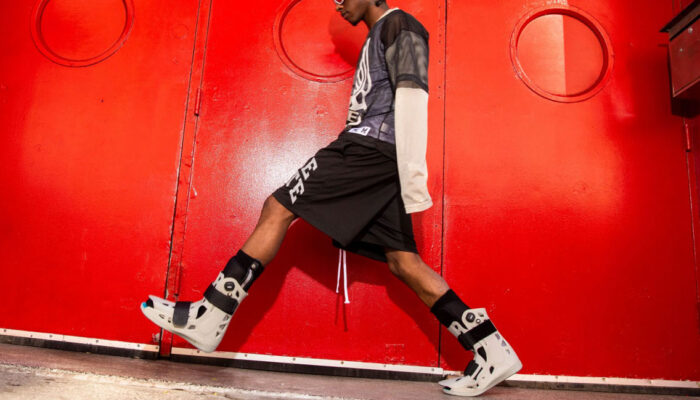7319 Maison Chanvre – Owner/Pioneer, Ben Thompson
Venetia Tyler sits down with 7319 Maison Chanvre creative director Ben Thompson to find out more on his luxury hemp-based fashion brand
7319 Maison Chanvre is a new sustainable leisure wear brand that’s paving the way for a new perspective on clothing manufacturing. Constructed from a bespoke blend of 67% hemp and 33% organic cotton, 7319 hemp is produced in Portugal with the aim of redefining sustainable fashion. This conversation around sustainability is more present and pressing than ever, and designers are now coming up with new, innovative ways to build fashion labels that are eco-friendly, greener and have a smaller carbon footprint. 7319 hemp is one of those brands. They have created a sustainable line where even the packaging is as friendly to the planet as the clothing. With hemp’s many benefits, such as its sustainable properties coupled with its versatility, Ben Thompson reveals how the brand started.

VT: Hello, Ben. To start us off, tell us about your background. You studied at university reading French, but was fashion always in the back of your mind?
Ben: I knew I wanted to create a brand from an early age and I would always find clothes were the ways I’d express myself. I found a sense of culture and community where I felt truly comfortable being myself – relating and connecting with boys my age when street brands like Supreme became popular within youth culture. Through immersing myself into that community I made connections to people who became some of my closest friends and business associates to this day.
One of my best friends had an extremely tough battle with cancer and sadly passed away a few years ago, but I really saw the benefits of him using CBD/ THC when he was ill. I admired how he lived each day like it could be his last. 7319 was born soon after that.
VT: Which brands are influences on 7319 Maison Chanvre?
Ben: Maharashi and Patagonia have always found stylish and sophisticated ways to introduce the more organic fabrics like hemp etc. As a follower of streetwear with a love for Raf Simons, Margiela and Dior, I always had to find a comfortable combination for sport, travel, etc. So, I think our first collection was born from my desire to wear organic clothing with a bit more of a relaxed fit.

VT: Can you tell us a bit about your childhood and how it is linked to the obvious French/European aesthetic of your brand?
Ben: I was born and raised in France. When I was 8-years-old my family moved to England and I attended a French-speaking school. I then dropped out of university to jump into my own lane. The main reason for this was, I have never felt I as if I belonged in the traditional educational system. But growing up in both countries taught me a lot about those two different cultures from every angle, so this clearly sowed the seeds to never stop evolving and exploring the possibilities of Hemp 7319.
VT: What do you do in your free time when you are not creative director of 7319 Hemp?
Ben: I’ve started growing my own hemp in the South of France, where I grew up. The sails and ropes in the South of France that were once made from hemp have now been replaced with less sustainable materials (plastic and cotton). However, more recently people are finding ways to reintroduce hemp as a sustainable manufacturing material.
As someone who also loves sport, I’ve always worn a lot of polyester. From a recycling and breathability point-of-view, I’ve noticed that this composition is not as cosy as it used to be, and overproduction is rife with the demand ever-increasing. Hemp bioplastic could be used to replace everything from football tops, the plastic cones on training fields, your cups and hot dog wrappers – even the seats in the stadiums themselves. As there is a lot to accomplish on this front, I think collaboration amongst individuals with the same mindset is essential.

ABOUT THE BRAND
VT: Tell us about the research process behind the use of hemp?
Ben: Hemp has been used for thousands of years across the globe, especially in France where fishermen used it as ropes and chords for their boats. It has been used in Nepal, Japan and Korea for clothing too. Hemp additionally absorbs over 22 tons of CO2 per hectare, making the production of hemp fabric a carbon negative process which helps us achieve the CO2 emissions goals set by the Paris agreement in 2015. In addition to this, the material is antimicrobial – an essential property considering our current pandemic.
VT: And who are the key people involved in 7319 Maison Chanvre?
Ben: So, the team contains a select group of individuals whom I’ve met at various points in my life who all share a passion for using hemp. James Loach Has been a friend of mine for years and his experience in the fashion world. His passion for this project made it extremely easy for us to get it off the ground, and his advice and knowledge as an insider in the industry has been so insightful for me. Harry Crum, again, an old friend from my school days, is also on board!

VT: A lot of your production is done across Europe, particularly in France and Portugal, where the latest collection was made. Is having the manufacturing and sourcing locally done in the UK ever something you have thought about?
Ben: I have indeed. Sadly, the truth is the UK is one of the biggest exporters of cannabis but the laws imposed on hemp growers here are prehistoric in comparison to Poland, France, Portugal and Spain. To me, these laws are archaic and outdated because now you can buy CBD oil over the counter, yet we can’t produce it here in these fields in England because the Home Office treats hemp like narcotics or firearms? We’ve had to destroy 40 acres of an organic, naturally growing plant because of a slight adjustment in the laws about the THC content and problems of licensing. Surely, instead of destroying 40 acres of a plant that could have provided so much aid to people throughout the country, the government could have perhaps confiscated it and turned it into CBD oil for patients in the NHS suffering from serious cancer and mental health issues.…
Of course, when covid first hit there were delays in our production, but patience was key. Then coming into the new year there was a lot of confusion regarding new Brexit regulations and importing goods into the UK from the EU. So, as we have started the process to grow our own hemp from grain to garment in France, I believe a fully functional 360° operation in France/ EU will be the wisest step going forward to remain as environmentally friendly as possible.

VT: The use of hemp is original and refreshing to the industry. But, beyond that, what would you say makes your brand stand out from other contemporary streetwear/leisurewear labels?
Ben: Our material is a unique, breathable and ideal for pre, during and post working out/training. Hemp’s incredible to going out in for normal everyday as well. We pride ourselves on making pieces that will not only last but also improve with time.
VT: Finally, do you have any long-term plans to expand your collections and create different varieties of garments?
We thought we’d keep people cosy during the hard times at home. And as hemp is new to a lot of people, a simple introduction to see its benefits through a tee, hoodie, etc, made it more regular, almost.. People honestly have to see and feel the benefits of the materials to believe it.
For more information about 7319 Maison Chanvre, click here.




